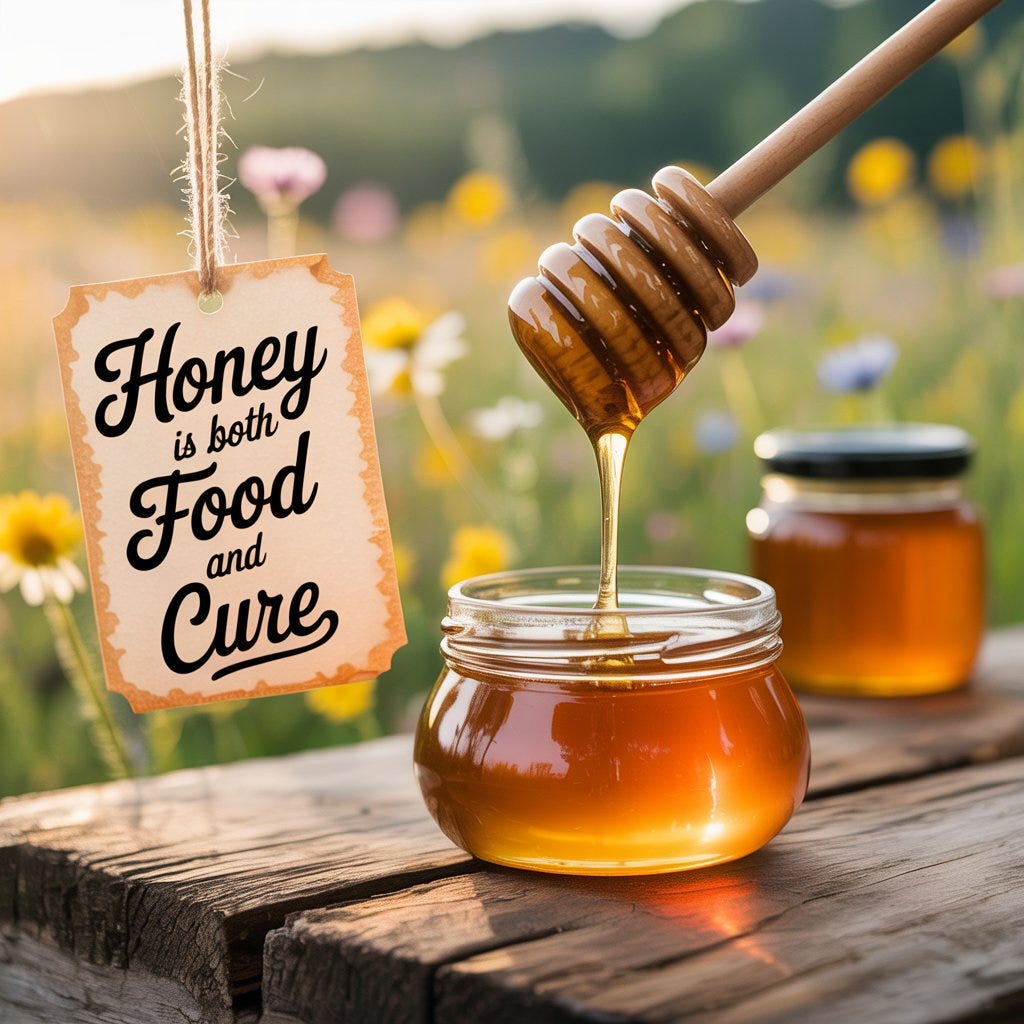Honey is both food and cure.

Honey is a natural food and medicine that serves as a remedy even for countless and incurable diseases.
1. A Boxer’s Miraculous Recovery through Honey
Many decades ago, a team of boxers from Pakistan were travelling abroad to participate in international competitions. One of the team members was deported by the doctors because he had developed jaundice (peelia). That athlete sought treatment from a renowned physician of that era, who was a specialist in the Prophetic Medicine (Tibb al-Nabawi).
2. One Week Honey Therapy: Shocking Medical Results
He was given approximately two kilograms of pure honey within about a week, after which he was referred to a jaundice specialist for examination. The doctor was astonished to see that the boxer had recovered completely in just one week. For reassurance, he conducted all the necessary tests — and yet, all the reports were normal.
3. Healing Power of Honey in the Qur’an
Honey has healing properties. Its benefits are mentioned in the Holy Qur’an, in Surah An-Nahl (16:68–69):
“And your Lord inspired the bee, saying: Make your homes in the mountains, in the trees, and in what they build. Then eat of every fruit and follow the ways of your Lord laid down [for you]. There emerges from their bellies a drink of varying colours, in which there is healing for people.”
4. Divine Declaration: Honey Heals All
Since Allah, the Lord of Glory, has declared in the Qur’an that honey provides healing (shifa), it merits contemplation that it offers healing in all forms.
5. Historic Use of Honey by the Companions of the Prophet ﷺ
History records that when Hazrat Auf ibn Malik al-Ash’ari (may Allah be pleased with him) fell ill, he instructed his son to bring rainwater, olives, and honey. He said that the Qur’an has proclaimed rainwater and olives to be blessed and honey to be a source of healing. Upon consuming these three items, he regained full health.
6. Unwavering Faith in Qur’anic Medicine
Another historical incident reports that when Hazrat Abdullah ibn Umar (may Allah be pleased with him) developed a skin condition, he used honey and recovered completely — even though Hazrat Nafi‘ (may Allah be pleased with him) had advised against sweet foods for that ailment. But Abdullah ibn Umar insisted, “My treatment will be honey, because the words of the Qur’an can never be wrong.”
7. Modern Medical Research on Honey’s Efficacy
In modern medical history, numerous cases of healing through honey are documented. Approximately 28 years ago, a Doctor Crawford from Salford University in England treated 200 patients suffering from high fever and allergies using only honey — all of whom recovered fully. Another case, published in a reputable medical journal around the same time, involved Dr Thomas administering one kilogram of honey over five days to a pneumonia patient, resulting in full recovery.
8. Effective Honey Remedies for Respiratory Diseases
For asthma or chest diseases, it is said that a decoction made with radish seeds and honey, given morning, evening, and before sleeping, brings immediate relief. Honey is also beneficial for coughs — sucking on honey helps. Traditional physicians warn, however, that old or spoilt honey should not be consumed. They also provide a test to identify genuine honey: a dog will not eat pure honey, but if it is mixed, it will eat it.
9. Additional Benefits of Honey for Digestion and Jaundice
Honey is useful in cold-related illnesses, especially chest problems, and it also stimulates appetite. Mixing it with water can purge the stomach if vomiting is induced. It sharpens vision and strengthens teeth, quenches thirst, and is even beneficial in jaundice. For throat and mouth ailments and difficulty swallowing food or drink, honey is helpful.
10. Ancient Vedic Wisdom on Honey
According to ancient Vedic texts, honey consumption improves eyesight and relieves vocal hoarseness. When purified and applied to wounds, honey not only heals but also promotes new tissue growth. It is considered a sexual tonic and is useful in leprosy (kūdḥ), cough, and leucorrhoea. It also expels intestinal worms and reduces body fat. It relieves nausea and heart diseases as well. Physicians and Vedas both caution against consuming honey that has been sun-dried or heated.
11. Greek and Eastern Views on Rainwater-Honey Mixtures
Greek physicians regarded honey mixed with rainwater as beneficial, whereas practitioners of Eastern medicine sometimes deemed such mixtures harmful. The Greeks also believed that rainwater with honey could dissolve kidney stones. If blisters are present in the bladder or intestines, honey cleanses them.
12. When Honey Might Be Harmful
Doctors say that individuals with a choleric temperament — those who feel excessive thirst or have a hot and dry nature — may be harmed by honey in warm weather, and it may trigger nausea, vomiting, and bile-related diseases.
13. Honey in Classical Islamic Medicine (Al-Qanun)
In the authoritative medical work Al-Qanun (The Canon), honey is described as a stomach accounting for stomach tonics. Physicians recommend that if children are given equal parts castor oil and honey, it alleviates colic. Adding a bit of fennel or anise extract enhances the results. The warm water in which honey is dissolved is considered ‘warmer’ by doctors and is said to relieve mental ailments and cold joint pains, and, besides healing cold organs, it strengthens them.
It relieves joint pain, stomach rumbling and cough; reduces lung inflammation; stimulates appetite; and relieves urinary burning.
Final Thoughts
In short, honey is a natural food and medicine that serves as a cure for countless — even incurable — diseases. We just need to know how to use it properly, and it is essential to consult a qualified physician or doctor before using it.

0 Comments